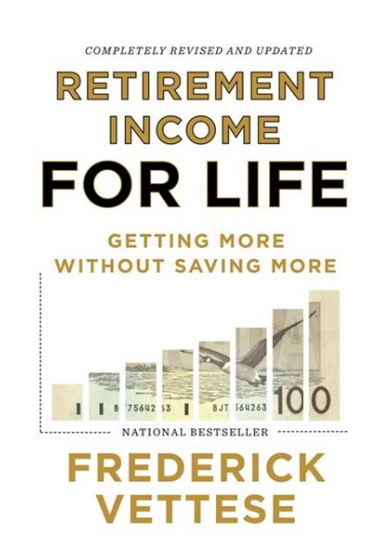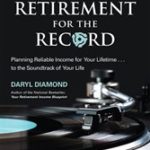 My latest MoneySense Retired Money column looks at two recently published books by two of the country’s top authors on Retirement Income Planning. You can find the full column by clicking on this highlighted headline: Near retirement without a Defined Benefit pension? Here’s what you need to know.
My latest MoneySense Retired Money column looks at two recently published books by two of the country’s top authors on Retirement Income Planning. You can find the full column by clicking on this highlighted headline: Near retirement without a Defined Benefit pension? Here’s what you need to know.
One of the new books is retired actuary Fred Vettese’s new revised edition of his book, Retirement Income For Life, which I first reviewed in 2018, and which you can find here. Vettese has revised and expanded the book to the spring of 2020, allowing him to look at the Covid-19 issue and how an extended Covid-related bear market could put further wrenches in retirement plans.
The book describes several “enhancements” to a base case of an average almost-retired couple with no DB pensions and roughly $600,000 in savings. This base case – Vettese dubs them the Thompson family — pay high investment management fees (on the order of 2%, typically via mutual funds).
Couples in his base case also tend to take CPP as soon as it’s on offer at age 60 and OAS as soon as possible at age 65. Vettese continues to pound the table about the value of these government pensions and recommends that people like the Thompsons delay CPP till age 70 if at all possible. Remember, in the absence of a DB plan, CPP and OAS are worth their weight in gold, being government-guaranteed-for-life sources of income that are inflation-indexed to boot.
Vettese is fine with ordinary average folk taking OAS at 65. However, and this seemed new to me, in a section for high-net worth couples (which he defines as having $3 million in investable assets), he suggests they should also delay OAS to age 70, along with CPP.
As an actuary, Vettese sees this enhancement as a simple case of transferring risk from a retiree’s shoulders to the government’s. Why worry about investment risk and longevity risk when the government can worry about it on your behalf?
Similarly, a related enhancement is to engage in the same type of risk transfer by converting a portion of registered savings to the shoulders of life insurance companies: he suggests 20% can be annuitized, ideally after age 70. That’s a bit less than the 30% his first edition he recommended immediately upon retirement.
One of Vettese’s enhancements to the base case is simple enough: to cut investment management fees. Larry Bates devoted an entire book to this theme: Beat the Bank, which I reviewed two years ago here.
Try the free PERC calculator
There are two other less compelling enhancements: knowing how much income to draw and having a backstop. Knowing how much income can be figured out with a free calculator that Vettese twigs readers to: PERC or the Personal Enhanced Retirement Calculator, available at perc.morneaushepell.com.
 Readers should be aware there is a second point of view on the wisdom of delaying government pensions. It’s contained in a just-published follow-up to Daryl Diamond’s Your Retirement Income Blueprint. His new book is called Retirement for the Record: Planning Reliable Income for Your Lifetime … to the Soundtrack of Your Life.
Readers should be aware there is a second point of view on the wisdom of delaying government pensions. It’s contained in a just-published follow-up to Daryl Diamond’s Your Retirement Income Blueprint. His new book is called Retirement for the Record: Planning Reliable Income for Your Lifetime … to the Soundtrack of Your Life.
“Give serious consideration to first using those income streams that disappear when you do,” Diamond writes, “My preference is to use first any income streams that run out (or reduce) when the client passes away, rather than tapping into personal assets that have both a survivor and estate benefit … This is another factor in favour of taking government benefits early, because payouts of OAS stop on the death of the retiree and their CPP pension either ends or reduces for the survivor.”



The only other consideration is your health and genetic predisposition. If you don’t have these things on your side, perhaps it’s best to take your government income streams earlier? Comments?
Thanks.
Elizabeth Hoyle
For sure! As they say, retirement planning would be simple if you just knew when you were going to die! if you have good genes, healthy habits and are blessed financially and socially, odds are you will live a long time and should delay CPP and maybe OAS. If not, may as well take early.
Jonathan, thank you for your very helpful article on delaying OAS.
Can you suggest how to determine at age 65, if delaying OAS makes sense for a woman who is married to someone who she is likely to outlive by 11 years?
Thank you.
Re Vettese statement about purchasing 20% annuity, he then questions his own statement but doesn’t expand on the alternative.